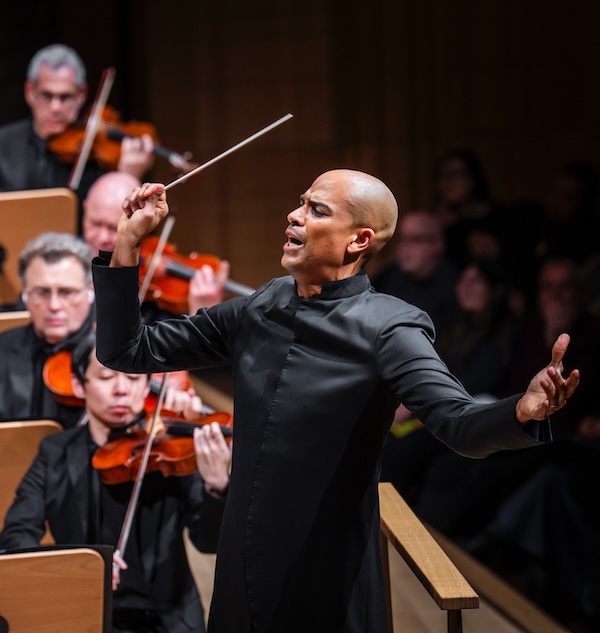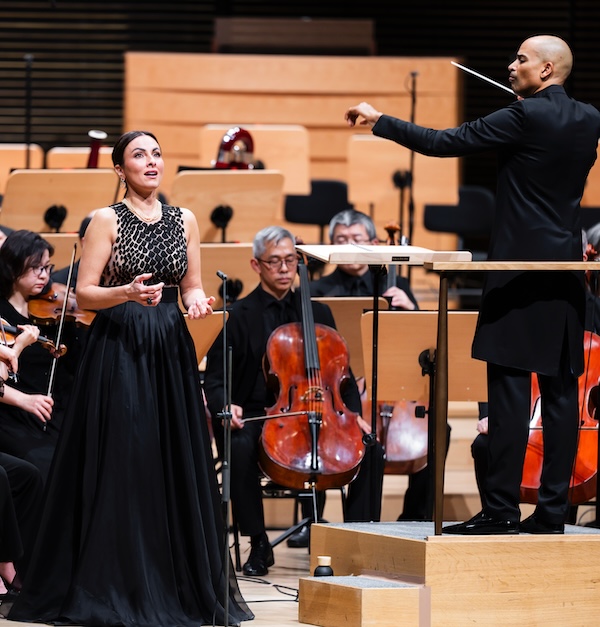Edusei roams widely and brilliantly in Philharmonic debut

The program of the New York Philharmonic’s concert Thursday night was largely about journeys, but it started with an arrival.
In an impressive Philharmonic debut, the German conductor Kevin John Edusei presented a brilliant calling card in Samy Moussa’s Elysium, then took listeners on poetic and philosophical trips with music of Berlioz and Richard Strauss.
In a program note, Moussa recounted that he composed the piece first, then thought of a title. He linked this music to the place that the Greek philosopher Empedocles identified as the ultimate destination for heroes and doers of good works, where they live among the gods “free from human woes, safe from destiny, and incapable of hurt.”
As conjured by the Montreal-born, Berlin-based composer, the Elysian fields were awash in light, bursting upon the listener in a blaze of B-flat major and ascending from there with horns and brass. Sparkling sonorities of piccolo and high strings and a series of ascending scales in vibraphone and violins sustained the upbeat mood as the music segued from a leisurely beat to a more urgent pace.
For all its excitement, the 12-minute piece closed on a note of equanimity and contentment with a solo flute, mezzo forte. The audience warmly welcomed the composer as he joined Edusei on stage for a bow.
Mezzo-soprano Isabel Leonard, a local favorite for her affecting performances with the Metropolitan Opera, left operatic display behind to convey the intimate sentiments of Berlioz’s song cycle Les Nuits d’été. In velvety tones discreetly supported by Edusei and dry-brush strokes in the orchestra, Leonard bounced lightly through the cycle’s two framing songs “Villanelle” and “L’Île inconnue,” and probed more deeply in the four songs in between.
The singer’s subtle shadings matched the ambiguous emotions of “Le Spectre de la rose,” while her cries of “Ah!” lit up the night in “Sur les lagunes: Lamento.” Beckoning a faraway lover in “Absence,” Leonard’s long notes tapered gorgeously in the adagio tempo. “Au Cimetière: Clair de lune” throbbed gently with memories evoked by the moonlit cemetery scene.
After intermission, moonlight changed to sunrise with the dazzling opening bars of Strauss’s Also Sprach Zarathustra. Edusei dispatched the famous passage briskly, going straight to the ambiguous mutterings that the composer labeled with Nietzsche’s chapter title “Of Those in the Unseen World.” The unseen became seen quickly enough, in a crescendo that nearly matched the opening sunrise for intensity, leading to a stormy agitato (“Of the Great Longing”).
The tall, long-limbed conductor kept his gestures economical as he guided the players in a series of effective, well-knit climaxes, marking moments of enlightenment in the imagined journey of Nietzsche’s fictional Zoroaster. A characterful bassoon solo over sighing strings (“The Dirge”) brought a cheery response from violins, flutes and harps, then (“On Science”) a fast fugue on the three-note sunrise motive, with Edusei managed with admirable transparency.
A whiff of a Viennese waltz–more than a whiff, actually, more like a big inhale—countered all this seriousness, with concertmaster Frank Huang in the Johann Strauss role, leading the way with his sweetly leaping violin. Edusei held this section together less firmly than the others, losing ensemble in the tempo rubato and blurring the long-short waltz rhythm.
Another big crescendo pulled the players together again, however. The quiet closing pages (“Night Wanderer’s Song”) benefited from the exquisite tuning of the solo violin, clarinet and flute, putting in relief the piece’s famously contradictory conclusion, a high B major chord over pizzicato C in the bass—a final, soft reminder of humanity’s estrangement from nature.
The program will be repeated 7:30 p.m. Friday, Saturday and Tuesday. nyphil.org

Posted Jan 04, 2025 at 10:07 am by TPM
Totally agree about the first half: The Moussa may have been the finest new work I’ve heard at the Phil since “Fire in my Mouth” in 2019, and Isabel Leonard was glorious in the Berlioz. The orchestra played both wonderfully.
But the trumpets had a terrible night in the Strauss which, given their prominence at some key moments, really ruined the performance for me. The first trumpet entrance, one of the most iconic moments in all music, featured a split note and then a wobble. Unless I am much mistaken (and my seats were towards the back of the orchestra, so I might be), Principal Trumpet Chris Martin had the night off—if so, too bad.
You describe Edusei as “tall and long-limbed.” He may have the longest arms and fingers I’ve seen outside the NBA.
Posted Jan 06, 2025 at 9:10 am by PLK
Thanks to Mr. Wright for an informative review. I wondered if the Strauss work was taken too slowly but agree with the reviewer’s good points. Two other items:
1) The house lights were up so one could actually read the text of the poems as they were performed–a real plus which does not happen enough;
2) I was as the Saturday concert and the audience gave the first work an ovation—the first time I have heard a new piece given such approval. I think that it was in part because the work actually sounded like pieces we have enjoyed for years rather than one of those new compositions which start with percussion,
go to dissonance and minimal notes. This work had romantic weight.